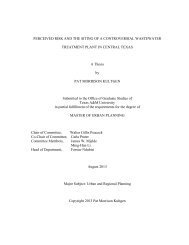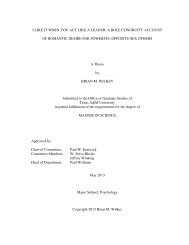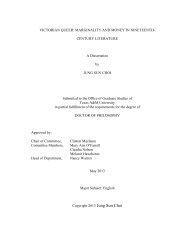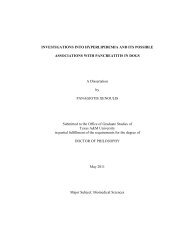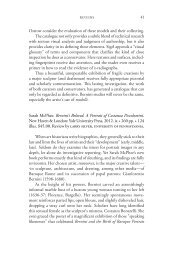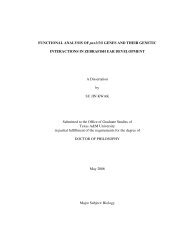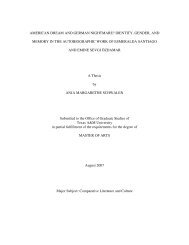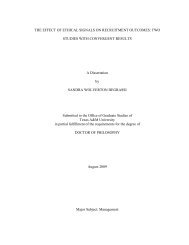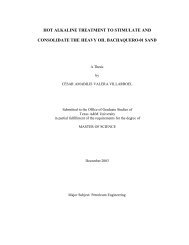- Page 1 and 2:
A CASE STUDY OF SEVEN TAIWANESE ENG
- Page 3 and 4:
ABSTRACT A Case Study of Seven Taiw
- Page 5 and 6:
DEDICATION This dissertation is ded
- Page 7 and 8:
TABLE OF CONTENTS vii Page ABSTRACT
- Page 9 and 10:
CHAPTER Page Constant Comparison An
- Page 11 and 12:
CHAPTER Page Conclusions………
- Page 13 and 14:
LIST OF FIGURES xiii Page Figure 4.
- Page 15 and 16:
opportunity to practice communicati
- Page 17 and 18:
communication strategies, since hum
- Page 19 and 20:
skills associated with the five com
- Page 21 and 22:
2. Strategy: “Procedures used in
- Page 23 and 24:
presents the findings regarding the
- Page 25 and 26:
In 1972, Selinker and Savignon repo
- Page 27 and 28:
Faerch and Kasper’s (1983a) class
- Page 29 and 30:
variables of proficiency level, gen
- Page 31 and 32:
language speakers’ brain. He indi
- Page 33 and 34:
Psychological Analysis of Second-La
- Page 35 and 36:
second or foreign language, through
- Page 37 and 38:
subjects’ communication strategie
- Page 39 and 40:
(1995) provided six suggestions how
- Page 41 and 42:
explored whether the communication
- Page 43 and 44:
and adjusting meanings, five of the
- Page 45 and 46:
new interlanguage word such as an
- Page 47 and 48:
CHAPTER III METHODOLOGY Qualitative
- Page 49 and 50:
makers of the curriculum design at
- Page 51 and 52:
The significance of Tunghai Univers
- Page 53 and 54:
1) Participants considered themselv
- Page 55 and 56:
His mother tongues were Taiwanese (
- Page 57 and 58:
communication strategies in the ill
- Page 59 and 60:
Procedures Data Collection 1) Resea
- Page 61 and 62:
(1985), 90 minutes was the most app
- Page 63 and 64:
that was described thickly and inte
- Page 65 and 66:
The constant-comparison coding meth
- Page 67 and 68:
open-ended questions because they w
- Page 69 and 70:
According to Denzin and Lincoln (19
- Page 71 and 72:
Conformability According to Schwand
- Page 73 and 74:
Trustworthiness According to Lincol
- Page 75 and 76:
training process, the data were col
- Page 77 and 78:
at the students’ after-class time
- Page 79 and 80:
their various personal beliefs and
- Page 81 and 82:
in this study was comparison analys
- Page 83 and 84:
certain topic: Topic avoidance was
- Page 85 and 86:
keep away from the wearisome topics
- Page 87 and 88:
Cheng Chih showed his disapproving
- Page 89 and 90:
Jiun Sheng, in his first interview,
- Page 91 and 92:
About the topic avoidance strategy,
- Page 93 and 94:
a polite child from when he was in
- Page 95 and 96:
Ling Mei Fang seemed that we did no
- Page 97 and 98:
not signal the others about our baf
- Page 99 and 100:
(すみません= I am sorry.) when
- Page 101 and 102:
deemed that it was necessary to lea
- Page 103 and 104:
Abandonment strategy saved my face
- Page 105 and 106: I couldn’t detect whether classma
- Page 107 and 108: in a fluent and voluble way. Ling M
- Page 109 and 110: Tien Long perceived that difficult
- Page 111 and 112: teacher requested that she should k
- Page 113 and 114: certain people with whom to talk. J
- Page 115 and 116: Research Question Three What Do Tai
- Page 117 and 118: eplaced words. In the second interv
- Page 119 and 120: In the second interview, Tien Long
- Page 121 and 122: meaning beyond doubt. I preferred t
- Page 123 and 124: The communication would not be stop
- Page 125 and 126: eplacement strategy was not easy fo
- Page 127 and 128: Jiun Sheng Chang Jiun Sheng thought
- Page 129 and 130: frequently. He explained that the l
- Page 131 and 132: straightforwardly. If they have bee
- Page 133 and 134: I felt “generation” was like lo
- Page 135 and 136: imagination. If I would like to say
- Page 137 and 138: Cheng Chih believed that “word co
- Page 139 and 140: is a carbon lacking an electron. An
- Page 141 and 142: would exemplify horse and donkey by
- Page 143 and 144: class to demonstrate for the resear
- Page 145 and 146: After five weeks of training, Tien
- Page 147 and 148: failure of expression through using
- Page 149 and 150: In the interview, Ling Mei perceive
- Page 151 and 152: The language created through “wor
- Page 153 and 154: not predict for our interlocutors t
- Page 155: 142 vague. I perceived that at leas
- Page 159 and 160: asked me what our home assignments
- Page 161 and 162: Cheng Chih conveyed, when doing a c
- Page 163 and 164: this happened very frequently, I pe
- Page 165 and 166: Cooperation upgraded your English p
- Page 167 and 168: other the others when using the “
- Page 169 and 170: In the first interview, Ling Mei me
- Page 171 and 172: FIGURE 4.5. Perceptions of the Coop
- Page 173 and 174: CHAPTER V THEMES This study was des
- Page 175 and 176: way of interacting. Similarly, in L
- Page 177 and 178: proficiency English learners. Sung
- Page 179 and 180: found. Students reflected that the
- Page 181 and 182: deconstructed Chinese characters an
- Page 183 and 184: FIGURE 5.4. Themes Associated with
- Page 185 and 186: the cooperation strategy with the i
- Page 187 and 188: FIGURE 5.6. Major Themes Retrieved
- Page 189 and 190: impressions about each skill in fiv
- Page 191 and 192: finally would be able to attain the
- Page 193 and 194: ackgrounds and gender difference in
- Page 195 and 196: herself. The above examples provide
- Page 197 and 198: of their clearly marked foreigner r
- Page 199 and 200: contributed to reducing students’
- Page 201 and 202: key word in their intended content
- Page 203 and 204: application of communication strate
- Page 205 and 206: through communication strategies an
- Page 207 and 208:
study, based on the students’ per
- Page 209 and 210:
ehavior impeding his/her own promot
- Page 211 and 212:
such as interlanguage patterns in c
- Page 213 and 214:
communication (pp. 2-27). Harlow, U
- Page 215 and 216:
Strategies in interlanguage communi
- Page 217 and 218:
Guba, E. G., & Lincoln, Y. S. (1989
- Page 219 and 220:
I, 163-174. McKay, S. L. (2002). Te
- Page 221 and 222:
http://www.colostate.edu/Depts/Spee
- Page 223 and 224:
September, 3, 2006, from, http://ww
- Page 225 and 226:
Reduction Strategies: Topic Avoidan
- Page 227 and 228:
IV. Lexical A :Do you think that gi
- Page 229 and 230:
Apparent Avoidance, caused by lack
- Page 231 and 232:
1.2 Reduction Strategy: Message Aba
- Page 233 and 234:
Abandon unknown process of religion
- Page 235 and 236:
Do not preserve the topic or concep
- Page 237 and 238:
3. L2-based strategies: A: I am goi
- Page 239 and 240:
Example of meaning replacement: vag
- Page 241 and 242:
II. Paraphrase: Describe, Exemplifi
- Page 243 and 244:
III. Word Coinage: Make Up a New Wo
- Page 245 and 246:
Achievement Strategies: Cooperation
- Page 247 and 248:
4.Learners signal their interlocuto
- Page 249 and 250:
Week Two Conversation Questions Wha
- Page 251 and 252:
Week Four Conversation Questions Cr
- Page 253 and 254:
APPENDIX H Consent Form (In English
- Page 255 and 256:
APPENDIX I 同意書 (Consent form
- Page 257 and 258:
APPENDIX K 錄影帶授權書 (Vide



